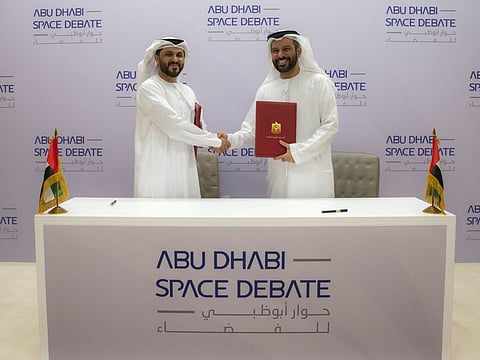UAE Space Agency, Bayanat to develop geospatial analytics platform
Platform is expected to be fully operational by fourth quarter of 2023

Abu Dhabi: The UAE Space Agency and Bayanat signed a partnership agreement to develop and operate a geospatial analytics platform for the Space Data Centre, one of the transformational projects announced by the UAE government.
The agreement was signed on the sidelines of Abu Dhabi Space Debate, which is under the patronage of President His Highness Sheikh Mohamed bin Zayed Al Nahyan. The platform is expected to be fully operational by fourth quarter of 2023.
Under the agreement, Bayanat, a pioneer in AI-based geospatial solutions, will create an innovative ecosystem for Earth observation apps by making the most of the capabilities of large-scale data management and processing, and creating analytical reports based on Earth observation satellites.
The partnership agreement was signed by Salem Butti Al Qubaisi, director general of the UAE Space Agency, and Hasan Al Hosani, CEO of Bayanat in the presence of several officials and employees from both sides.
Peaceful use in space sector
Sarah bint Yousef Al Amiri, Minister of State for Public Education and Advanced Technology and Chairperson of the UAE Space Agency, said: “At the UAE Space Agency, we are keen to promote peaceful uses in the space sector and deploy big data, data science and space technologies to serve humanity in facing sustainability challenges and finding practical solutions to overcome them.”
“The platform falls within the main strategic objectives of the UAE, which aims to empower the space services sector and its apps; and encourage their use in a way that contributes to raising the efficiency of government work and the competitiveness of the private sector,” she added.
Knowledge economy
Al Qubaisi noted: “The signing of the partnership agreement with Bayanat comes in line with our vision and strategic objectives to involve the private sector in our national initiatives and projects to advance all its components.
“Through this platform, the UAE Space Agency will stimulate the growth of space apps and value-added services that enable and support the private sector. The signed agreement is a key enabler to achieve the objectives of the Space Data Centre to provide an innovative ecosystem to leverage space data and technologies to meet global sustainability challenges and increase the number of startups and patents in the space industry,” he added.
Bayanat will operate a platform that will be developed using the latest artificial intelligence technologies to analyse data and benefit from the results in improving human lives and advancing the components of the knowledge economy.
Roadmap
Al Hosani, for his part, said: “Our partnership with the UAE Space Agency is the beginning of a roadmap that will contribute to finding solutions to various challenges in the space ecosystem, within the framework of our strategic goals to harness our technologies for innovation and leadership in the space sector, which has a lot to explore.”
“The progress of space apps and space information certainly contributes to enhancing our daily lives and provides valuable data to track and monitor natural disasters and risks, and from this standpoint we will continue to work with the UAE Space Agency to ensure improvement and further support the development of the local and global space ecosystem,” he continued.
Competitive space economy
The geospatial analytics platform of the Space Data Centre will contribute to meeting the main requirements of the transformation projects announced by the UAE government, as part of its efforts to embody the directives of His Highness Sheikh Mohammed bin Rashid Al Maktoum, Vice President and Prime Minister of the UAE and Ruler of Dubai, to focus on creating the most active and best economy in the world.
The UAE Space Agency aims to facilitate access to satellite data for scientists, researchers, government and private institutions, startups, and community members, to develop solutions that support national and global challenges in the form of space data apps and value-added services (VAS). In addition to its role in promoting international cooperation and partnerships.
The geospatial analytics platform will include a “market-place”, which will allow startups, medium and small enterprises, and entrepreneurs to design, develop, and commercialise space apps and value-added services. The platform is expected to be fully operational by the fourth quarter of 2023.
Sign up for the Daily Briefing
Get the latest news and updates straight to your inbox



